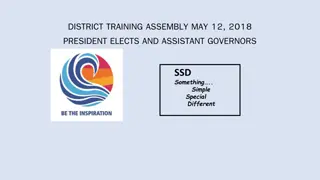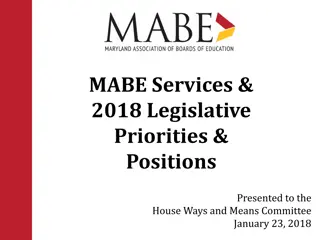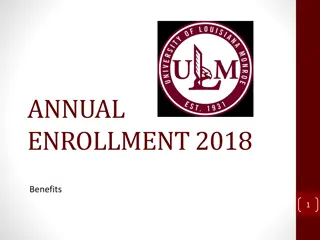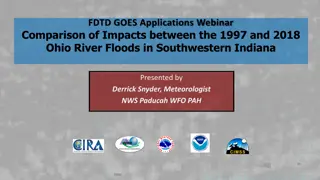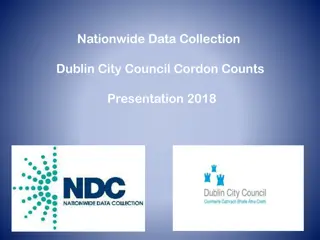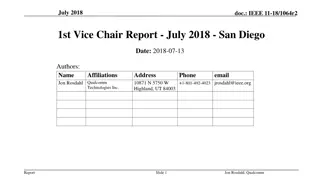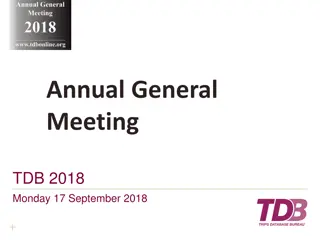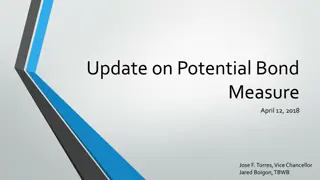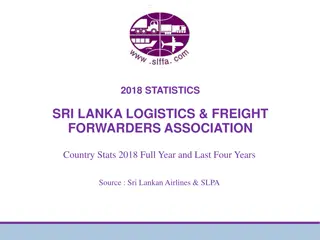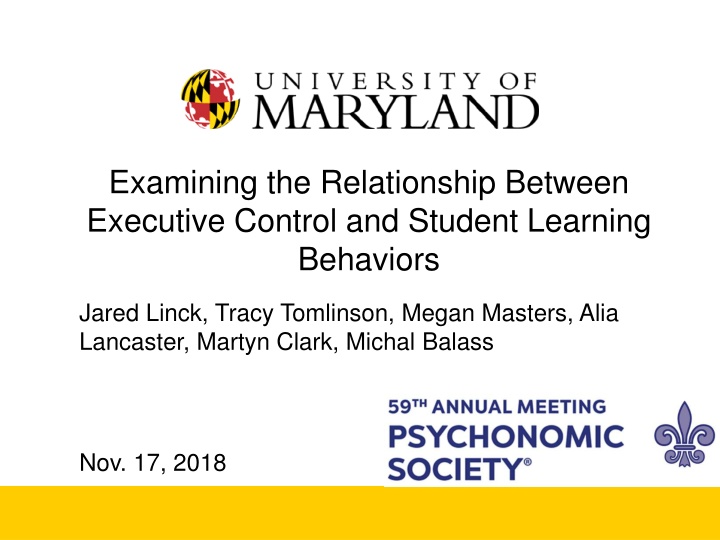
Impact of Executive Control on Student Learning Behaviors
Explore the relationship between executive control and student learning behaviors in online courses, delving into the challenges and methods of research on learning analytics. Discover how cognitive factors may influence learning activity patterns within a Learning Management System (LMS), with a focus on individual differences in cognitive processes, LMS usage, and learning outcomes.
Uploaded on | 1 Views
Download Presentation

Please find below an Image/Link to download the presentation.
The content on the website is provided AS IS for your information and personal use only. It may not be sold, licensed, or shared on other websites without obtaining consent from the author. If you encounter any issues during the download, it is possible that the publisher has removed the file from their server.
You are allowed to download the files provided on this website for personal or commercial use, subject to the condition that they are used lawfully. All files are the property of their respective owners.
The content on the website is provided AS IS for your information and personal use only. It may not be sold, licensed, or shared on other websites without obtaining consent from the author.
E N D
Presentation Transcript
Examining the Relationship Between Executive Control and Student Learning Behaviors Jared Linck, Tracy Tomlinson, Megan Masters, Alia Lancaster, Martyn Clark, Michal Balass Nov. 17, 2018
Growth in learner data Increased interest in capturing students online learning activities o Examining micro-behaviors through Learner Management System (LMS) usage Growing demand for learning analytics 2
Research on Learning Analytics Most focus on online or blended courses Mixed results on how LMS usage facilitates learning (Gasevic et al. 2016) o Inconsistency in measuring LMS usage o Predictive power varies by course type o More use does not always mean more engagement and/or learning (Halverson et al., 2014; You, 2016) 3
Research on Learning Analytics Challenges Lack of research exploring how cognitive factors may influence learning activity patterns within an LMS Goal: Empirically examine individual differences in cognitive processes, LMS usage, and learning outcomes 4
Methods Students in two psychology courses o Research methods: N = 121 o Statistics: N = 119 LMS usage variables and course grades Cognitive tasks completed online for course extra credit 5
Statistics and Research Methods Courses 8
LMS variables Page views Time in course space (minutes) # submissions Current score 10
Course grades Three exams Two written news article assignments Participation score Homework assignments score Extra credit Final grade (%) **Outcome in analyses = Final Score 11
Cognitive tasks Construct Measure Explicit rule induction Letter Sets Implicit rule induction Serial Reaction Time task Inhibitory control Antisaccade Task switching Task Switching Numbers Working memory updating Running Memory Span 12
Analysis Courses analyzed separately Cognitive task scores were standardized prior to analysis Correlations (bivariate relationships) Multiple regressions (moderation analysis) 13
RQ1: Is LMS usage related to learning outcomes? 14
RQ2: Are cognitive abilities related to LMS usage? 15
RQ3: Do cognitive abilities moderate the effects of LMS usage on outcomes? 16
Results LMS page views & total minutes unrelated Fewer than half of participants completed cognitive measures 17
RQ1: LMS & outcomes No significant correlations between global LMS usage and Final course grade 18
RQ2: Cognitive & LMS Analyzed subset with cog scores o Methods n = 44, Stats n = 48 No significant correlations between global LMS usage and cognitive measures Largest numerical correlations in .20s, for Methods course Fewer total minutes might correlate with: o Better WM updating (r = -.22) o Worse shifting (r = -.24) 19
RQ3: Interactions Best-fitting models had no interactions Final Grade only related to WM Updating and Explicit Rule Induction 20
Summary of Findings Simple measures of amount of LMS usage unrelated to Final Course Grades Cognitive processes unrelated to amount of LMS usage 21
Summary of Findings (cont.) Final Course Grades o Better WM Updating and Explicit Rule Induction related to better outcomes o No interactions between LMS usage and cognitive processes 22
Potential Factors Course format o Face-to-face vs. blended vs. online LMS familiarity LMS usage measures too broad o Clear need for more nuanced measures of learning related to course activities 23
Future Directions Move to more sophisticated quantitative and qualitative analyses o LMS user styles e.g., active, passive, bystander (Tseng et al., 2016) o Sequential pattern modeling Examine links between cognitive processes and specific learning behaviors 24
Conclusions Novel research at the intersection of cognitive abilities, educational measurement, and learning analytics Potential for LMS usage data and cognitive measures to enable personalized instruction 25




